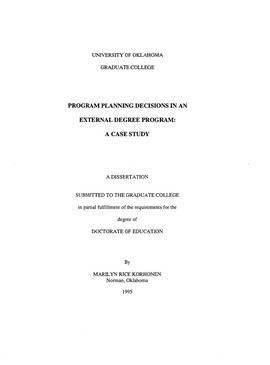| dc.contributor.advisor | Greene, Gary | |
| dc.contributor.author | Korhonen, Marilyn L. Rice | |
| dc.date.accessioned | 2017-11-15T00:19:51Z | |
| dc.date.available | 2017-11-15T00:19:51Z | |
| dc.date.issued | 1995 | |
| dc.identifier.uri | https://hdl.handle.net/11244/52416 | |
| dc.description.abstract | Some adult educators pursue a "grand" program planning model (Pennington & Green, 1976; Sork & Caffarella, 1990). Others question the applicability of any standard set of principles and procedures to all learning contexts (Cervero & Wilson, 1991; Brookfield, 1988). The purpose of this study was to explore this issue through a qualitative case study in which "planning in action" is documented in a single program and compared to models to determine which, if any of the models account for the processes and actions recorded. | |
| dc.description.abstract | The target population of the study was university administrators, governmental administrators, continuing educators, faculty, and students. The context of the study is a university sponsored, external graduate program involving an institution of higher education, a governmental agency, and their respective subgroups. | |
| dc.description.abstract | Data were collected through a qualitative process including interviews, participant observation, and document analysis. A modified dialectic hermeneutic process was followed to clarify issues and themes. Data were analyzed using a constant comparative method to develop a rich description of the case. | |
| dc.description.abstract | Analysis led to a rich description of the case in both an historical and a present context. Four main themes emerged from the data, appropriateness of the use of institutional resources in the program, issues of program ownership and control, issues of quality, and elements directly related to program planning decisions. | |
| dc.description.abstract | The study found that no single model nor any classification of models accounts for the myriad program planning activities and issues in this case. For example, individuals were proactive developers in contrast to the responsive role depicted in models. Developers used relationships and networks to build support and gather resources. Each of the stakeholders shared considerable decision making power. The process included the design of a reward structure for instructors and the sponsoring institution. The learner emphasis espoused by many models was not evident in this case. | |
| dc.description.abstract | These findings suggest that program planning is an art rather than a science. Therefore, attempts to define a single, ideal process are not advised. Rather, the field should seek expanded understanding of the variety of approaches and processes that lead to effective program development. | |
| dc.format | xv, 247 leaves ; 29 cm.. | |
| dc.language | en_US | |
| dc.subject | Educational planning | |
| dc.subject | Adult education | |
| dc.subject | Degrees, Academic | |
| dc.subject | Educational Leadership and Policy Studies, Dept. of | |
| dc.title | Program planning decisions in an external degree program: A case study | |
| dc.type | Dissertation | |
| dc.type | text | |
| dc.contributor.committeeMember | Pappas, James P. | |
| dc.contributor.committeeMember | Dillon, Connie | |
| dc.contributor.committeeMember | Buckley, Michael | |
| dc.date.manuscript | 1995 | |
| dc.thesis.degree | Ed. D. | |
| ou.identifier | 304116248 | |
| ou.group | College of Education::Department of Educational Leadership and Policy Studies | |
